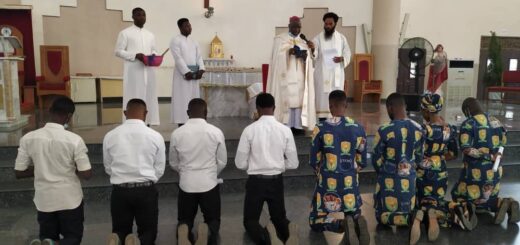The Decalogue and their Practical Implications
by ARCH BISHOP · March 7, 2021
Homily by Archbishop I. A. Kaigama on Third Sunday of Lent, Year B, Our Lady Queen of Nigeria Pro-Cathedral, Abuja, March 7, 2021.
READINGS: Ex 20:1-17; Ps. 18:(19):8-11; 1 Cor. 1:22-25; Jn. 2:13-25
On this third Sunday of Lent, we are called to reflect on the Decalogue, the Ten Commandments, and their practical implications in our relationship with God and with one another.
God gave the Law to Moses for the people of Israel to serve as a wise guide to them, and reminded them that He is “a jealous God” (Ex. 20:5), who tolerates no infidelity and disobedience, but prefers the person “who walks in the law of the Lord, who meditates on His law day and night” (Ps. 1:2).
Our first reading is about the Commandments that Moses received from God at Mount Sinai, given to the Israelites to protect and build their spiritual bond with God, and to spur them to positive living. Jesus summarized the commandments as: love of God and love of neighbour (cf. Mt. 22:37-38).
Without laws, we risk ending up as a chaotic society. We obey human laws such as traffic laws, security laws (curfew), but sometimes we feel that divine laws tamper with our personal freedom. Many desire to be free to use their bodies as they like; some want to use their freedom to deprive others of their freedom, e.g. to take the life of an unborn child or to kill in the name of politics or religion or ethnicity.
Our world seems not to understand why God must remain at the centre of all human affairs. St. Paul in our second reading was speaking about this type of attitude whereby the crucified Christ appeared as a stumbling block to the Jews and foolishness to the Gentiles. Many today see as foolishness the laws of God and influenced by moral relativism, believe there is no universal or absolute set of moral principles, and freedom is to do as one pleases. They want God to live up to their standards; rather than obey God’s laws to foster human solidarity, sustainable peace, harmony and progress.
If we were observing sincerely the laws of our two main religions in Nigeria, Islam and Christianity, about not stealing, corruption will be long gone and poverty will not be a problem because our human and natural resources will be appropriately utilized; if we pay attention to the injunction not to kill, bandits, kidnappers and religious extremists will not be violating people’s innate human dignity while calling on the name of God. We would not have had the Chibok, Kagara and the Jangede abduction of innocent school children. Similarly, the unnecessary tension between Muslims and Christians; Ibos, Tiv, Yoruba, tribes of Southern Kaduna et al, and Fulani who practise the “Abrahamic religions” will not arise.
When public officials take oaths of office, with their hand on the Bible or the Koran, they promise to serve selflessly, but many soon commit very unpatriotic acts and corruptly rob the poor, polarize and factionalize our people based on religious, ethnic or economic interests.
Jesus’ cleansing of the temple as reported in the Gospel of John and His statement, “Destroy this temple, and in three days I will raise it up” (Jn. 2:19) was not only a reference to the temple of ancient Israel, which was turned into a ‘house of trade’ (cf. Jn. 2:16) and ‘den of robbers’ (cf. Mk. 11:17), instead of being a place of prayer, but indicates also the worshippers’ corrupted dispositions of mind, body and conscience.
Today, some persons commercialize or politicize religion and are little concerned about forming their adherents to have a pure heart and a clean conscience (cf. Ps. 51:10). The dramatic cleansing by Jesus is meant to teach us about true worship and holiness; to remind us that we are living temples of the Holy Spirit (cf. 1 Cor. 6:19), and we must purify our hearts of those vices that pitch us against God, our neighbours and ourselves.
What Jesus wanted, and still wants today is for the Church to remain ‘a house of prayer for all peoples’ (Is. 56:7) and for us to worship God “in spirit and truth” (Jn. 4:23), marked by integrity, justice, compassion and sacrificial service of others. A place of worship is not a business centre or where to plot evil against those who are of a different religious affiliation, but should be a true dwelling place for God.
Jesus’ “righteous anger” of whipping and driving out the money changers and traders from the temple calls us to desist from our spiritual laxity, social injustice and extortions of helpless citizens. We exhibit great piety in our places of worship but in daily life promote corruption, social injustice, and allow bloodshed, violence and other atrocities.
What can save Nigeria from the fate of Sodom and Gomorrah (cf. Gn. 19) is the non hypocritical obedience to God’s commandments; not the going about in long robes, erecting conspicuous places of worship at strategic places, or shouting the loudest about God and religion. There must be a “spiritual sanitation” of the hearts of ALL Nigerians so that justice and peace can flow from our hearts.
Let us spiritually join Pope Francis, a pilgrim of peace, in his on-going visit to Iraq in whose address to the Iraqi President Barham Salih, he spoke of “an end to acts of violence and extremism, factions and intolerance” or “to justify acts of murder, exile, terrorism and oppression”. This sounds like the Holy Father was speaking to Nigerians too. A word is enough for the wise.




